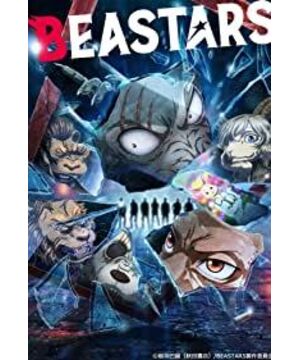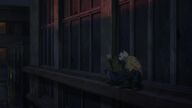To say the fifth word is to make people sick to the stomach, and the sixth word is to make people nauseated.
The black market sells meat, not only the corpses moved from the hospital, but also the live "bite the existing" fresh goods. Is it a bit sour to substitute prostitution, surrogacy, drug trafficking, and organ trafficking?
Kant said that human beings are not tools. In the animal society that "one step to the stomach", others are indeed not tools, but others are food?
The sixth episode of "Animal Rhapsody" mainly tells the story before and after the carnivores such as Legacy strayed into the black market selling meat.
The opening is an episode, news reports that there is a new incident of eating and killing, and the murderer is suspected to be a wolf. This information made the campus air somber. Both Legacy and his canine, KeJack, received a certain amount of scorn. Juno, a freshman in the drama club, was bullied for no reason. Luckily, Legacy, who was passing by, came to the rescue.
After that, the drama club held a meeting. In order to prepare for the meteorite memorial, the drama club had to send someone out of the campus to communicate with the government. Because the killing incident had just happened, the president decided to let Legacy wait, considering that the safety of herbivores might be threatened. Carnivore students go out on errands. Before leaving, Louis also specially reminded not to go to the black market. Here it can be seen that the black market may be a well-known one.
After that, carnivores such as Legacy, Tiger Bill, Eagle Aoba left the campus. During the day, they experience the order and freedom of the adult world. In the evening, these students lost their way and unknowingly came to the door of the legendary "black market".
Here, the boys see sheep selling their fingers. Bill excitedly proposes to scrape together to buy one of the sheep's fingers to eat, but Legacy disagrees and leaves angrily. But he ran into the black market carelessly, where he encountered the black market psychiatrist Panda, knocked unconscious by him and brought him back to the psychological clinic to receive non-professional psychological counseling in the form of sugar and sticks.
After leaving the panda psychological counselor, he met his classmate Qingye again on the street. Aoba also said that he was actually unwilling to eat meat because he thought of his companions in the drama club. Legacy was very sighed.
In the colored neon lights are the backs of Legoshi and Aoba, and this chapter ends.
The structure of the sixth episode is very neat, with the inner and outer plots alternating with each other, and it is full of metaphors of ideal and reality confrontation.
Entering society for the first time as a fledgling young man who is not represented by Regus, he is confused by the dark side of society, angry at the congruence of others, and confused by the doubts of others——
Am I abnormal, or is it someone else?
Is it abnormal that I don't want to endure bullying, or is it abnormal that you are willing to endure bullying?
Is it my immaturity for refusing to eat my peers, or is it your immaturity who is immune to such things as cannibalism?
Is there something wrong with me who falls in love with rabbits across races, or is there something wrong with you who casually define my love as twisted?
Does anyone define what is "normal", "healthy", "mature" and "should"?
Why are there always people, who are inevitably self-righteous, holding various unclear standards for people to abide by?
Objectively speaking, the reason why there are many answers may be that the answers themselves are uncertain.
It's a habit for carnivores to eat meat. Animals don't know whether it can be changed or not. Such uncertainty will make everyone have different answers when discussing "whether we should go to the black market" , the existence of different answers itself brings new and more uncertainties.
What is certain in a world full of uncertainty? Probably this:
Both humans and animals choose their behavior towards the outside world based on their impressions of the outside world. The content of this chapter is Chun's question in Legacy's memory - "What do you think of me?"
In the sixth episode, Harumoto Rabbit did not appear, but when the finger-selling goat showed Legosy his "goods", she played Legosy's "sanity" through memory. This section is the only flashback in this episode. The production team or the original author did not start the dialogue between Chun and Legacy and displayed this part as a flashback in the middle of the story. It may be because this section has a negative impact on the story. Stories are more important. In fact, the question of "how do you view me" is perhaps the most important question that runs through this passage, and this passage also revolves around how the individual "you" views the other body of "me".
This is a highly developed animal society on the surface. Animals live together, meat is prohibited, and there are many rules. Even birds have to take flight licenses, but this is obviously not a perfect society: frequent cannibalization incidents and well-known illegal The black market seems to declare that carnivores are either potential murderers or sanctimonious hypocrites; undisguised animal discrimination and long-standing animal bullying seem to imply that herbivores relied on legal and political correctness to trample carnivores at will. life, personality, dignity. Regarding the question "How do you think about me", this sentence shows two answers:
Answer A "Others are food/tools, and food/tools are commodities".
The voices of this answer have been echoing, seemingly from the illegal black market in the shadows of society, through the idea of Bill's mouth being stamped as "mature" and considered an "adult animal."
Animals who hold this answer are somewhat self-centered and cannot see others. It is easy to reduce the individual to a group and expand the fault of a single person to the entire group. The person who bullied Juno didn't even think about the murderer but the wolf was not Juno. When Bill proposed to raise money to sell goat fingers, he probably never thought about what his herbivorous classmates would think. He would also use some carnivores on the black market, ignoring the carnivores that do not eat meat (for example, the panda, which coexists black and white). uncle).
Animals who give this answer are superficially "savvy" and know to obey the rules, but they obey the rules because they are afraid of legal sanctions, but they do not understand the real meaning of social rules, and they do not realize that they benefit from obeying the rules. After suppressing this, he will ask for more indulgence as compensation, full of "I deserve it" and "I am wronged" emotions.
Answer B "Others are companions, and companions' companions are companions."
The second answer was very weak, and it only came from the two young people, Legoshi and Aoba. They were a minority in the society. They didn't know if they were right and would feel confused. People who hold this kind of answer are particularly idealistic, but full of perception. They see others as individuals, and consider the actual feelings and interests of others. They can feel the trust of others and are willing to respond to the trust of others. They will promote respect for close people. To similar people, does not rationalize harmful behavior to others. He has limited hunting instincts because of love, and they have higher pursuits than food.
In this memory killing, Rabbit Chun has a passage, she has a hunch that they will get better again. This passage is a bit abrupt at first glance, because Legosi and Rabbit Chun are actually not better off, let alone "getting good again". The creators asked Chun to say this may have a deeper meaning. Perhaps this "you" and "I" may point to the friendship between a single individual, and at the same time, it may also imply the group represented by Legacy and Chun - the meat eater Animals and herbivores, strong and weak, male and female. The hunch that Chun said of "getting better again" refers to the hunch of getting better again among these different members of society.
Both A and B are still members of nature, and neither is inherently superior or inferior, but which is more likely to develop in a society where herbivores and carnivores are a foregone conclusion and will continue to do so in the future. Needless to say, it's pretty clear.
The animated version of "Animal Rhapsody" is currently updated to the sixth chapter. When sorting out the content, I found that words such as "responsibility" and "companion" are still very important in this animation. I just recently read a small Japanese book called Introduction to Individual Psychology, and I feel that the ideas in it are somewhat similar to those expressed so far in "Animal Rhapsody". This book is called "The Courage to Achieve Happiness", and its predecessor is " The Courage to Be Hated" by Kishimi Ichiro and Koga Shiken.
Here's a quote from "The Courage to Be Happy":
"Behavioral goals are two-fold: (1) self-reliance. (2) harmonious coexistence with society.
There are also two psychological goals that underpin this behavior: (1) The awareness of "I am capable." (2) The consciousness of "everyone is my partner". "
The consciousness of 'I have the ability' is similar to what Louis said in the last few words, "Why can't you be responsible for your own power".
The consciousness of 'everyone is my companion' is what Eagle Aoba said in Chapter 6. I thought of my companions, so I thought eating meat was disgusting.
Text similar to book content is not uncommon, but the link between animation and book is mainly because of a coincidence——
The author of the book "The Courage to Obtain Happiness" introduced individual psychology, and the founder of individual psychology is called "Adler", which happens to have the same name as the protagonist of the play that he played.
Quite a coincidence, isn't it? Of course, it may also be a coincidence, just sharing it for everyone to see.
The sixth chapter also did a good job in character characterization. Benhua has new characters on the stage, and old characters are also strengthened. It can be clearly seen that the characters in this work are very vivid.
Juno is very cute, and it may be very aggrieved to keep her ears rolled up. Louis is an honest leader, and he is a good leader. Bill was carefree, he forgot after the fight, talked loudly about women, and wanted to scrape together to try animal fingers. Cheerful was cheerful, but it looked dangerous.
The more animals you see, the more you discover: with labels there are animals that cannot be represented by labels.
Mr. Panda is a representative of the label system that cannot be contained. He is a carnivore, but he can also be a vegetarian, just as his coat color is both black and white, he is a middleman who cannot be marked by social labels, and may be a marginal person in society - Uncle Panda is obviously not a qualified psychiatrist, because Psychological counseling is not like this at all, but consider how many regular professional psychiatrists would abandon their glamorous and comfortable lives and go into the black market to rescue lost carnivores? Although Uncle Panda's business ability is relatively rough, isn't it also handsome as a ferryman on the black and white border?
View more about Beastars reviews










